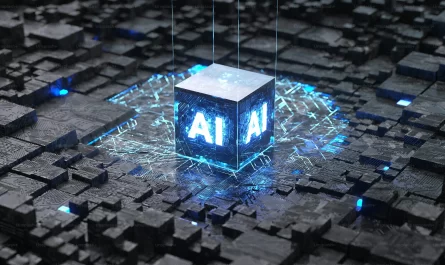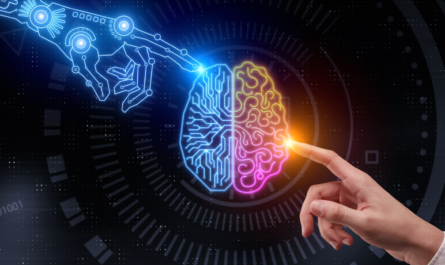Artificial intelligence is the simulation of human intelligence in devices that have been trained to reason, pick up new skills, and carry out jobs that traditionally call for human intelligence. It entails the creation of algorithms and models that give robots the ability to analyse data, spot patterns, come to conclusions, and change their behaviour in response to new information. Machine learning, natural language processing, computer vision, robotics, and expert systems are some of the subfields in AI that it encompasses.
Definition of Artificial Intelligence:
Artificial intelligence is the simulation of human intelligence in devices that have been trained to reason, pick up new skills, and carry out jobs that traditionally call for human intelligence. It entails the creation of algorithms and models that give robots the ability to analyse data, spot patterns, come to conclusions, and change their behaviour in response to new information. Some of the subfields of AI that it embraces include machine learning, natural language processing, computer vision, robotics, and expert systems.
Types of Artificial Intelligence:
Narrow AI and General AI are the two subtypes of artificial intelligence.
- Narrow AI (also known as Weak AI): Narrow AI refers to AI systems designed to perform specific tasks with high efficiency. These systems excel in a particular domain, such as image recognition, speech recognition, or data analysis. Virtual assistants like Siri or Alexa, recommendation engines, and fraud detection algorithms are a few examples of limited AI.
- General AI (also known as Strong AI): General AI refers to AI systems that possess human-level intelligence and can perform any intellectual task that a human being can do. General AI remains a concept under development and represents the goal of creating machines that exhibit consciousness, self-awareness, and the ability to reason and learn across various domains.
Applications of Artificial Intelligence:
Artificial Intelligence finds applications across numerous industries, transforming the way businesses operate and enhancing our daily lives. Some prominent applications of AI include:
- Healthcare: AI is revolutionizing healthcare through disease diagnosis, drug discovery, personalized medicine, and robotic surgery assistance. AI-powered systems can analyze medical images, predict patient outcomes, and assist doctors in making accurate diagnoses.
- Finance: AI is utilized in fraud detection, algorithmic trading, risk assessment, and customer service in the finance industry. Massive volumes of financial data may be analysed in real-time by AI algorithms, improving decision-making and lowering risk.
- Transportation: AI plays a crucial role in autonomous vehicles, optimizing traffic flow, and improving transportation efficiency. Self-driving cars rely on AI technologies such as computer vision and machine learning to perceive the environment, make driving decisions, and enhance safety.
- Customer Service: AI-powered chatbots and virtual assistants have become integral in customer service, providing instant responses, personalized recommendations, and 24/7 support. Natural language processing capabilities allow these AI systems to understand and respond to human inquiries.
- Manufacturing: AI-driven robots and automation systems have transformed manufacturing processes, increasing efficiency, precision, and productivity. Robots can perform complex tasks, handle repetitive operations, and adapt to changing production needs.
Benefits of Artificial Intelligence:
Artificial Intelligence offers several benefits that have a profound impact on society and various industries:
- Increased Efficiency: AI systems can perform tasks faster, more accurately, and tirelessly, resulting in increased productivity and efficiency. Automation of repetitive tasks frees up human resources to focus on more complex and creative endeavors.
- Enhanced Decision-making: AI algorithms can analyze vast amounts of data, identify patterns, and provide valuable insights to support decision-making processes. This empowers businesses and individuals to make informed choices based on data-driven predictions and recommendations.
- Personalization and Customization: AI enables personalized experiences by understanding user preferences and tailoring recommendations, content, and services accordingly. This level of personalization enhances user satisfaction and engagement.
- Improved Safety and Security: AI contributes to enhancing safety and security in various domains. AI-powered surveillance systems can detect anomalies and potential threats, while AI algorithms aid in fraud detection and cybersecurity by identifying patterns and anomalies in real-time.
Challenges and Considerations:
While AI offers significant benefits, it also poses challenges and considerations that need to be addressed:
- Ethical Implications: The development and deployment of AI raise ethical concerns regarding privacy, bias, accountability, and job displacement. It is crucial to establish ethical guidelines and regulations to ensure responsible and fair AI usage.
- Data Privacy and Security: AI systems heavily rely on data, raising concerns about data privacy and security. Safeguarding personal and sensitive data from unauthorized access and ensuring transparency in data handling practices are essential.
- Bias and Fairness: AI algorithms are susceptible to bias, reflecting the biases present in the data they are trained on. Efforts must be made to address algorithmic bias and ensure fairness and inclusivity in AI applications.
- Skills and Workforce Adaptation: The rise of AI necessitates upskilling and reskilling of the workforce to adapt to changing job requirements. Collaboration between educational institutions, policymakers, and businesses is crucial to bridge the skill gap and prepare for the AI-driven future.
Future Prospects of Artificial Intelligence:
The future of AI holds immense possibilities and potential advancements:
- Advancements in Machine Learning: Machine learning algorithms will become more sophisticated, enabling AI systems to learn from smaller datasets, handle complex tasks, and adapt to dynamic environments.
- Expansion of AI in Edge Computing: AI capabilities will be integrated into edge devices, allowing real-time decision-making and reducing reliance on cloud computing for AI processing.
- Human-Machine Collaboration: AI will increasingly focus on augmenting human capabilities rather than replacing them. Collaborative systems that combine human expertise with AI algorithms will become more prevalent.
- Explainable AI: Efforts will be made to develop AI systems that provide transparent explanations for their decisions and actions, promoting trust and accountability.
Artificial Intelligence is a transformative technology that is reshaping industries and our daily lives. Understanding its capabilities, applications, benefits, challenges, and future prospects is crucial for harnessing its potential and addressing its ethical implications. As AI continues to evolve, it is essential to strike a balance between innovation, responsibility, and the human-centric approach, ensuring that AI technologies serve humanity’s best interests and contribute to a more sustainable and inclusive future.




